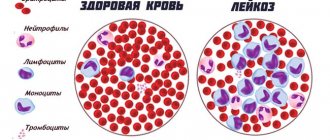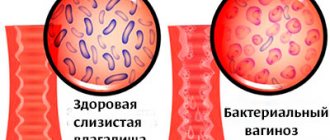- Possible complications
- Prevention of pathology
- Attending doctors
- Prices for services
Regulation of the normal menstrual cycle is carried out through the combined work of a cascade of levels, starting from the brain and ending with the endometrium (the mucous membrane of the uterus).
When ovarian dysfunction develops, disturbances occur in the hypothalamic-pituitary system, after which the processes of physiological synthesis of pituitary hormones (follicle-stimulating and luteinizing hormones) are disrupted. When pathological levels of hormones influence the ovary, the mechanisms of its activity are disrupted. That is, the physiological process of ovulation and the formation of the corpus luteum may be absent, which naturally leads to hormonal imbalance in the form of a disruption in the synthesis of the physiological level of estrogen and progesterone.
Insufficient synthesis of estrogen and progesterone affects the uterus and endometrium, forming the clinical manifestations of such a diagnosis as ovarian dysfunction.
Ovarian dysfunction refers to various pathological conditions, the development of which is caused by a violation of the hormonal regulation of the menstrual cycle, when the ovaries malfunction.
Symptoms of ovarian dysfunction
Dysfunction of the ovaries leads to the formation of certain characteristic clinical symptoms. The diagnosis of ovarian dysfunction can be manifested by the following symptoms:
- menstrual irregularities. This symptom is the most common complaint in women who have ovarian dysfunction. These disorders can be of a different nature: delays in menstruation, or, conversely, intermenstrual bleeding;
- amenorrhea: absence of menstruation may last for six months or more;
- Based on the fact that the ovarian-menstrual cycle is disrupted, the ovulation process may also be disrupted (the maturation of the follicle and the egg inside it, followed by its rupture and the release of the oocyte). If ovulation does not occur, then pregnancy is impossible. It is for this reason that when ovarian dysfunction occurs, the consequences can be of such a nature as infertility. Many couples turn to an obstetrician-gynecologist with just such a complaint, and the reason lies in the incorrect functioning of the ovaries;
- Violation of the hormonal function of the ovaries can result in miscarriage. This is a spontaneous abortion, a frozen (non-developing) pregnancy;
- severe course of premenstrual syndrome. Women begin to notice that PMS has become more severe and debilitating: irritability, mood swings, headaches develop, which can be combined with nausea;
- A violation of hormonal synthesis may develop in the direction of an increase in the amount of male sex hormones - hyperandrogenism. For this reason, women experience symptoms such as excess male-pattern hair growth (on the face, legs and arms, on the back and abdomen), rashes on the skin of the face, and increased greasiness of the hair and skin.
Complications and consequences
A disorder of the hormonal function of the ovaries in the absence of timely treatment can lead to serious consequences. Without correction, the pathology leads to a persistent disruption of the woman’s hormonal status, the most likely outcome of which will be infertility or the inability to bear a child. The risk of serious diseases of the reproductive system also increases significantly, especially in women of premenopausal age (40-45 years):
- fibroids;
- mastopathy;
- endometriosis;
- uterine fibroids;
- cancer of the uterus;
- breast cancer.
Causes
Ovarian dysfunction may be due to:
- infectious and inflammatory diseases of the ovaries themselves (oophoritis), as well as the mucous membrane of the uterus (endometritis) and fallopian tubes (salpingitis). In addition, the basis is often salpingo-oophoritis (adnexitis), when the pathological process affects both the ovaries and tubes;
- metabolic disorders and endocrine diseases (for example, thyroid dysfunction or obesity);
- termination of pregnancy (miscarriage or abortion);
- significant psycho-emotional or physical stress;
- inflammatory process associated with the installation of an intrauterine device;
- taking certain medications;
- exposure to radiation.
Pathogenesis
The regulation of ovarian function is determined by the hormones of the anterior pituitary gland : luteinizing hormone, follicle-stimulating hormone, prolactin . If at a certain stage of a woman’s monthly cycle the ratio of these hormones is correct, the ovarian cycle is not disrupted and ovulation occurs on time. Ovarian dysfunction occurs when regulation by the hypothalamic-pituitary system is disrupted, resulting in anovulation.
The absence of the corpus luteum phase and ovulation leads to the manifestation of a variety of menstrual cycle disorders associated with a lack of progesterone and excessive amounts of estrogen .
Types of ovarian dysfunction
Hormonal ovarian dysfunction has several types:
- Juvenile dysfunction is abnormal functioning of the ovaries, which occurs during the early development of menstrual function. It is typical for teenagers aged 16-18 years. Irregular, painful and heavy menstruation may be bothersome;
- ovarian dysfunction during the reproductive period. Pathology manifests itself in the reproductive period of a woman’s life. Characteristic symptoms are: irregular cycle, delays or frequent periods, their scanty or large volume;
- premenopausal or menopausal ovarian dysfunction, which is characteristic of the period of extinction of hormonal activity of the ovaries.
Classification
Since the term “ovarian dysfunction” is a collective concept, it includes the following conditions:
- hyperfunction;
- ovarian hypofunction;
- too active production of female sex hormones;
- too active production of androgens ;
- polycystic ovary syndrome;
- primary failure;
- unspecified dysfunction.
There is also a classification according to the patient’s age:
- juvenile – develops in adolescents immediately after the first menstruation;
- reproductive - develops in patients of reproductive age;
- menopause – diagnosed in the period before menopause and directly during menopause.
Diagnostics
At the initial appointment, the gynecologist-endocrinologist collects anamnesis, asking the patient leading questions, and also conducts an examination on the gynecological chair. The scope of the examination is determined individually and may include the following laboratory and instrumental studies:
- ultrasound examination of the pelvic organs and endocrine glands;
- blood tests for sex hormones, as well as thyroid and adrenal hormones;
- tests for STIs (sexually transmitted infections);
- CT and MRI of the brain to exclude pathology of the pituitary gland;
- smear on vaginal microflora;
- hysteroscopy, during which the doctor carefully examines the condition of the uterine cavity and removes a small piece of tissue for further histological examination;
- RDV (separate diagnostic curettage of the uterine cavity and cervical canal).
Diet
Diet for polycystic ovary syndrome
- Efficacy: therapeutic effect after 3 weeks
- Timing: constantly
- Cost of products: 1400-1500 rubles per week
Diet for ovarian cysts
- Efficacy: therapeutic effect after 3 weeks
- Timing: constantly
- Cost of products: 1500-1600 rubles per week
Proper nutrition is very important for the full functioning of a woman’s reproductive system. In order to prevent the development of ovarian dysfunction, it is important to consume those foods that will provide the woman’s body with important vitamins - A, B, C, E, as well as equally important microelements - copper, iron. Therefore, those who often practice mono-diets and fasting risk seriously harming the body as a whole and the reproductive system in particular.
It is important to include the following foods in your diet that are beneficial for the female reproductive system:
- Protein foods – if the body does not receive enough protein, the production of female sex hormones may be disrupted.
- cream , liver are sources of vitamin A.
- Sea buckthorn, rowan, carotene, pumpkin are sources of carotene, which is involved in the body in the formation of vitamin A.
- Black bread, bran, brewer's yeast will provide the body with B vitamins.
- Rose hips, currants, citrus fruits, onions, sauerkraut are sources of vitamin C.
- and green salad are sources of vitamin E.
- Nuts, dried fruits, beans, pomegranates contain iron.
- Seafood saturates the body with copper and has a positive effect on metabolic processes.
- Peanuts, oats, milk - contain argenine. This amino acid is very important for the ovaries.
Treatment of ovarian dysfunction
The doctor develops the optimal therapeutic regimen only after assessing the results of the examination. In general, treatment for ovarian dysfunction is aimed at:
- eliminating the causes that provoked its development;
- normalization of a woman’s hormonal levels and menstrual cycle;
- cessation of dysfunctional bleeding, if any.
To achieve these goals, both conservative therapy and surgical treatment may be recommended.
In particular, if STIs are detected, the doctor prescribes a course of antibiotics, as well as anti-inflammatory and restorative drugs. In case of diagnosis of endocrine diseases, the function of the corresponding endocrine glands is restored. If a tumor is found, surgery will be required.
The use of traditional methods without prior examination and consultation with a doctor can be not only useless, but also harmful to a woman’s health. Therefore, if symptoms such as a change in the duration of the cycle, the appearance of intermenstrual discharge, pain before and during menstruation appear, you should definitely consult a gynecologist.
Probability of pregnancy
Ovarian dysfunction is not a death sentence for women who want to have a child. Pregnancy is possible, but only with medication support. Preparation and attitude towards it must be especially attentive.
The duration of treatment is about 6 months and is carried out under the close supervision of a gynecologist-endocrinologist. The woman is prescribed a course of hormonal therapy aimed at restoring the ovulatory menstrual cycle. When the mature follicle reaches 18 mm, and the thickness of the endometrium is 8-10 mm, the woman is injected with hCG, which provokes ovulation. Ovulation is monitored using ultrasound of the follicles, basal temperature measurements and blood tests.
According to statistics, therapy is successful for 90% of women and it is possible to achieve conception. Further pregnancy is carried out under careful supervision.
Prevention of pathology
To prevent the development of ovarian dysfunction, it is necessary to exclude those factors that can provoke this pathology.
You need to lead a healthy lifestyle, trying to eliminate stress, and also regularly visit an obstetrician-gynecologist for a preventive examination. This will allow timely detection of diseases of the pelvic organs. In addition, it should be remembered that the use of hormonal contraceptives should be carried out under the supervision of the attending physician.
Proper nutrition and body weight control play an important role.
If there are pathologies of the endocrine glands, it is necessary to be under the supervision of an endocrinologist who will develop an optimal therapeutic regimen and monitor the patient’s condition.
Treatment with folk remedies
Home remedies can be used in the treatment process as auxiliary methods. However, before doing this, you should definitely consult your doctor about this.
The most commonly used are infusions and decoctions of herbs, which take a long time to get the effect.
- Strawberry leaves . 1 tbsp. l. leaves pour 400 ml of water. After 6 hours, strain. Drink 1 tbsp every day. l. Similarly, you can prepare a healthy drink from raspberry leaves. These remedies are indicated for those who have heavy periods.
- Calendula . 10 g of dried flowers pour 200 ml of boiling water. Strain after 3 hours. Drink 2 tbsp. l. three times a day. The product helps regulate the monthly cycle.
- Viburnum bark . 1 tbsp. l. chopped bark, pour 250 ml of water and boil for 20 minutes. Add water so that you end up with the same amount of liquid as at the beginning. Drink 1 tbsp three times a day. l. The remedy is indicated for heavy bleeding.
- Red clover . Collect clover inflorescences, dry, 3 tbsp. l. Pour boiling water over this raw material and leave. Drink 2 tbsp. l. three times a day.
- Nettle . 1 tbsp. l. nettle pour 1 tbsp. boiling water, then boil for another 10 minutes. Drink this portion in small sips throughout the day. The product helps restore hemoglobin . However, it is important to consider that nettle increases blood clotting.
- Coltsfoot and sweet clover . Prepare a mixture of these herbs (10 parts coltsfoot and 1 part sweet clover), prepare an infusion by taking 1 tbsp. l. product in a glass of water and leave for 10 minutes. in a water bath. The product helps with heavy periods.
- Cinquefoil anseri . 20 g of the product should be poured into a tbsp. boiling water and cook for another 15 minutes. Cool, drink 4 r. 50 g per day before meals. The remedy is indicated for painful periods.
- Onion peel . Remove the skins from 1 kg of dry onion, pour in 2 tbsp. boiling water and cook for another 20 minutes. Drink half a glass in the morning after waking up. The remedy is indicated for scanty periods.
- Black radish juice . Grate the radish and squeeze out the juice. Add 1 tbsp to it. l. honey, stir. Drink 2 tbsp. l. before meals 4 times a day.
- Borovaya uterus . A decoction is prepared from 100 g of herb and 1.5 glasses of water. Boil the product for half an hour, drink 4 times a day, 1 tsp.
- Water pepper . 1 tbsp. l. herbs pour 1 tbsp. boiling water, leave. Drink 1 tbsp. l. three times a day. The infusion helps reduce blood loss during heavy periods and reduce the severity of pain.
- Ruta . Pour 5 g of rue leaves into 150 g of boiling water and cook for 15 minutes. so that the product does not boil, but simmers. Strain and drink the entire dose in the morning after waking up, then do not eat for 5 hours. Take the product once during scanty periods.
- Horsetail . 1 tsp. herbs pour 1 tbsp. boiling water Infuse and drink 1 tbsp. l. three times a day. Recommended for painful and heavy periods.
- Blueberry branches . This product is used for douching. 1 tbsp. l. means pour Art. boiling water and leave for 30 minutes. Before douching, dilute the infusion with water.
For various disorders of the monthly cycle, it is also recommended to use herbal teas:
- First collection . Mix equal parts of birch leaves, mint, blackberry, yarrow herb, buckthorn bark, take 1 tbsp. l. means and pour boiling water (1 tbsp.). Strain and drink throughout the day. Take 3 months, the course can be repeated after 2 months. Indicated for irregular periods and pain.
- Second collection . Mix equal parts of buckthorn bark, lemon balm leaves, valerian root and cinquefoil herb, take 1 tbsp. l. product and pour 200 ml of boiling water over it. Strain after a few hours, drink a glass of the product 3 times a day for 5 days. Start treatment a few days before your period and stop on the first day.
- Third collection . Mix 2 tbsp. l. sweet clover, meadowsweet, meadowsweet, calendula, string, brew 1 tbsp. l. means Art. boiling water Drink the resulting infusion in the morning and evening. Start taking it on the last day of your period and continue treatment until the next one.
- The fourth gathering . Take 1 part wormwood, 3 parts oregano and lovage, 4 tbsp. l. garden quinoa. Stir, 3 tbsp. l. collection, pour 1 liter of boiling water. Take 100 g 6 times a day. Indicated for scanty periods.
- Fifth collection . Take 1 part each of fennel and juniper fruits, rue herb, St. John's wort, and cinquefoil; 2 parts each of parsley root, parsley seeds, rose hips, wormwood herb. Pour 2 tbsp. l. means 400 ml boiling water. After infusion, drink 100 ml twice a day. Take for 2 months. with scanty periods.
Why does amenorrhea occur?
According to statistics, 10% of women aged 17 to 45 experience secondary amenorrhea. Here the disorder occurs when the menstrual cycle has already established. Cases of primary amenorrhea, in which there was no menstrual bleeding initially during adolescence, are quite rare. This may be due to a delay in physical development, a debilitating diet, or a severe psycho-emotional state.
The menstrual cycle is regulated by different organs and systems: the cerebral cortex, the hypothalamus and pituitary gland, the ovaries and the target organs of the reproductive system. Amenorrhea can be caused by a disorder at any level of regulation. Here a secondary form of pathology develops.
The most common causes of amenorrhea in women:
- polycystic ovary syndrome;
- anorexia;
- ectopic and normal pregnancy;
- regular stress;
- premature menopause;
- early menopause;
- high levels of the hormone prolactin;
- imbalance of other sex hormones;
- exhaustion of the body.
The development of amenorrhea is also facilitated by the use of oral contraceptives, diet and fasting, infections and inflammation of the pelvic organs, and rapid weight gain.
Ovarian dysfunction is a disease common to women of childbearing age. The first sign that there is some kind of disease in the female reproductive system is a disruption of the menstrual cycle. Ovarian dysfunction is dangerous because it can be a harbinger of various gynecological diseases and infertility.
The essence of the disease is ovarian dysfunction.
Quite often, women experience abnormal menstruation, that is, the cycle becomes either too short from two to three weeks, or too long - longer than thirty-five days.
Such menstruation can cause ovarian dysfunction.
The ovaries are one of the most important organs in the female reproductive system. The ovaries are located in the woman’s pelvis, their task in the female reproductive system is to produce female sex hormones - estrogens (to a greater extent), progestins and androgens to a lesser extent.
If the ovaries are working correctly, then menstruation “comes” regularly, the normal cycle is 21-35 days with a “bloody” period of three to seven days, ovulation occurs regularly. If menstruation is not regular, the menstrual cycle is disrupted, then a woman should think about ovarian dysfunction and not delay in contacting a professional gynecologist.
The disease ovarian dysfunction may not cause concern to a woman, but its consequences in the form of infertility, endometriosis, and oncology should force the woman to consult a specialist and undergo a course of treatment for this disease.
Symptoms of ovarian dysfunction.
What ovarian dysfunction is is clear. What are the symptoms of the disease:
- Irregular menstrual cycle.
- Scarcity or abundance of discharge during menstruation.
- Blood between cycles.
- Pain in the lower abdomen and lower back
- Poor health before the onset of menstruation - drowsiness, apathy, irritability, etc.
- Absence of menstruation for six months
- Severe pain during menstruation.
These symptoms can appear in a woman all at once or separately. The presence of any of these symptoms should be a reason for a woman to consult a gynecologist for help. Diagnosing ovarian dysfunction can lead to severe gynecological diseases - endometriosis, malignant tumors, ectopic pregnancy, infertility.
Why does ovarian dysfunction occur? Causes.
There are many reasons for the occurrence and development of ovarian dysfunction:
- inflammatory diseases, such as adnexitis, salpingoophoritis, oophoritis, endometritis, cervicitis
- uterine and ovarian diseases;
- endocrinological diseases;
- frequent worries, stress;
- overwork at work, intense mental work, lack of proper rest, poor nutrition, etc.
- abortions
- incorrect installation of the intrauterine device
- frequent use of solarium
- some medications.
Diagnosis of ovarian dysfunction.
The diagnosis of ovarian dysfunction can only be made after a thorough and correct examination.
As a rule, if a diagnosis of ovarian dysfunction is suspected, the patient undergoes an ultrasound of the pelvic organs, adrenal glands, thyroid gland, and tests (general blood count, general urinalysis). It is also necessary to undergo examination and be tested for sexually transmitted infections.
To exclude oncology, material should be taken for histology and biopsy.
Any other examinations and tests, including MRI, may also be prescribed, depending on the specific situation and the woman’s health condition.
Treatment of ovarian dysfunction.
Each course of treatment for ovarian dysfunction is purely individual, depending on the results of the examination. Treatment of ovarian dysfunction can be carried out on an outpatient or inpatient basis.
Treatment of ovarian dysfunction is purely individual and is prescribed by a gynecologist after examination.
As a rule, the following measures are taken to combat the disease:
- Emergency measures - stopping bleeding, raising hemoglobin, etc.
- Fighting the causes that led to the disease.
- Bringing the menstrual cycle back to normal.
- Regulation of hormonal levels.
No amateur activities in the treatment of ovarian dysfunction should be allowed, because A woman’s health and reproductive functions are at stake.
Is it possible to get pregnant if diagnosed with ovarian dysfunction?
A question that plagues many women faced with this disease.
Ovarian dysfunction is the main cause of infertility. If pregnancy does occur, it may end in miscarriage.
Also very often, ovarian dysfunction causes ectopic pregnancy.
A normal pregnancy with a diagnosis of ovarian dysfunction is very rare, but possible.
In any case, pregnancy if a woman has ovarian dysfunction can be planned only after the menstrual cycle has normalized.
Gynecologists at Only Clinic, having many years of experience and relying on the achievements of world medicine, individually develop a course of treatment for ovarian dysfunction for each patient.
Firstly, hormonal drugs are prescribed, which are selected individually. They are usually taken from days 5 to 9 of the cycle. Doctors constantly monitor the process of follicle maturation and regularly conduct ultrasounds for this.
If you follow all the recommendations of the gynecologist at the Only Clinic and do not lose hope, then the desired pregnancy will definitely come.
To make an appointment with gynecologists at the Only Clinic, call +7











